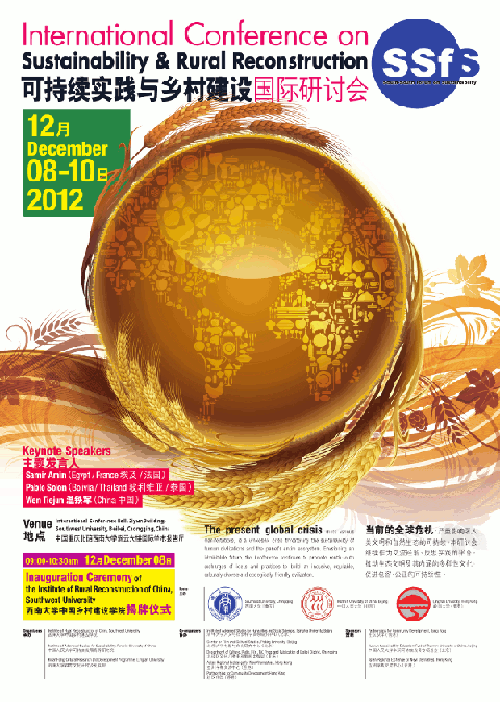Event Title
2012 International Conference on Sustainability & Rural Reconstruction
Start Date
10-12-2012 10:15 AM
End Date
10-12-2012 11:15 AM
Language
English
Description
Agrarian reform is at the heart of rural reconstruction and both are essential to achieving sustainable development. It includes not only land redistribution but also empowerment of peasants as key actors in building the rural economy. Land is not only an asset to be owned and accessed but also as a natural resource with multiple uses for both economic development and protection of ecosystems. Land ownership has hitherto been a centerpiece question in Philippine development, indeed, in nation building. Land monopoly on one side and landlessness on the other have defined to a large extent the history and political economy of the country. Poverty in the Philippines is basically a rural phenomenon and rooted to landlessness and monopoly control of capital, technology, and markets essential to building the local economy. The economic elite whose wealth is connected to land ownership is also the political elite. A succession of nine presidents had presided over the Philippines’ post-World War II development. Collectively, these regimes have failed to eradicate poverty and reduce inequality. Land reform policies and legislations, by design, contain many loopholes favoring landlords. State action to redress the social injustice was motivated mainly by fear of rural unrest and the desire to prevent peasant movements from developing into a full blown revolution. Rural reconstruction, as envisioned and practiced by the Philippine Rural Reconstruction (PRRM), is mainly about building sustainable communities from the ruins of war and conflicts, against the stubborn persistence of poverty and inequality, bad governance, environmental degradation and changing climate. Rural reconstruction in the Philippines has had to grapple with a host of other major challenges attendant to building a sustainable rural economy as the bedrock of a sustainable national development. A sustainable rural economy is built on the basis of resilient communities and resilient ecosystems.
土地改革是农村重建的核心,两者是实现可持续发展的关键。这不仅包括土地再分配,更重要的是赋权农民、使他们成为农村经济建设的主角。土地不仅仅是一种可以被占有、被取得的资产,更是为经济发展和生态环境保护提供各类用途的自然资源。因此,土地所有权成为菲律宾发展最重要的问题,也是整个国家建设的核心。土地垄断阶级和无地阶级长期以来在很大程度上决定了整个国家的历史和政治经济脉络。贫困在菲律宾基本上是一个农村现象,它植根于无地阶级,以及对资本、技术和经济市场保持垄断的阶级。 那些和土地所有权相扣连的经济精英自然而然成为了政治精英。自二战以来,菲律宾的九位总统都未能根除整个社会的贫困问题,减轻社会的不公平现象。土地改革政策和相关立法存在许多有利于地主的漏洞。出于对农民动乱的恐惧, 同时也为了防止农民动乱最终扩大成为全面的革命运动,菲律宾政府出面采取行动抑制社会不公平。菲律宾农村重建机构(PRRM)所设想和实践的农村重建主要包括在战争和冲突的残骸上建立可持续发展社区、反对顽固的贫困问题和社会不公;反抗坏政府、环境恶化和气候变化现象。菲律宾的农村重建不得不处理一系列和可持续农村经济发展相关的挑战,这是通向可持续国家发展的基石。一套可持续的农村经济也依赖于富有弹性的社区和生态环境之上。
Document Type
Conference
Presentation Material
Recommended Citation
Serrano, I. R. (2012, December). Agrarian reform and rural reconstruction in the Philippines. Paper presented at 2012 International Conference on Sustainability & Rural Reconstruction, Southwest University, Chongqingng, China.
Included in
Demography, Population, and Ecology Commons, Growth and Development Commons, Other International and Area Studies Commons, Place and Environment Commons, Sociology of Culture Commons
Agrarian reform and rural reconstruction in the Philippines = 菲律宾土地改革与农村重建
Agrarian reform is at the heart of rural reconstruction and both are essential to achieving sustainable development. It includes not only land redistribution but also empowerment of peasants as key actors in building the rural economy. Land is not only an asset to be owned and accessed but also as a natural resource with multiple uses for both economic development and protection of ecosystems. Land ownership has hitherto been a centerpiece question in Philippine development, indeed, in nation building. Land monopoly on one side and landlessness on the other have defined to a large extent the history and political economy of the country. Poverty in the Philippines is basically a rural phenomenon and rooted to landlessness and monopoly control of capital, technology, and markets essential to building the local economy. The economic elite whose wealth is connected to land ownership is also the political elite. A succession of nine presidents had presided over the Philippines’ post-World War II development. Collectively, these regimes have failed to eradicate poverty and reduce inequality. Land reform policies and legislations, by design, contain many loopholes favoring landlords. State action to redress the social injustice was motivated mainly by fear of rural unrest and the desire to prevent peasant movements from developing into a full blown revolution. Rural reconstruction, as envisioned and practiced by the Philippine Rural Reconstruction (PRRM), is mainly about building sustainable communities from the ruins of war and conflicts, against the stubborn persistence of poverty and inequality, bad governance, environmental degradation and changing climate. Rural reconstruction in the Philippines has had to grapple with a host of other major challenges attendant to building a sustainable rural economy as the bedrock of a sustainable national development. A sustainable rural economy is built on the basis of resilient communities and resilient ecosystems.
土地改革是农村重建的核心,两者是实现可持续发展的关键。这不仅包括土地再分配,更重要的是赋权农民、使他们成为农村经济建设的主角。土地不仅仅是一种可以被占有、被取得的资产,更是为经济发展和生态环境保护提供各类用途的自然资源。因此,土地所有权成为菲律宾发展最重要的问题,也是整个国家建设的核心。土地垄断阶级和无地阶级长期以来在很大程度上决定了整个国家的历史和政治经济脉络。贫困在菲律宾基本上是一个农村现象,它植根于无地阶级,以及对资本、技术和经济市场保持垄断的阶级。 那些和土地所有权相扣连的经济精英自然而然成为了政治精英。自二战以来,菲律宾的九位总统都未能根除整个社会的贫困问题,减轻社会的不公平现象。土地改革政策和相关立法存在许多有利于地主的漏洞。出于对农民动乱的恐惧, 同时也为了防止农民动乱最终扩大成为全面的革命运动,菲律宾政府出面采取行动抑制社会不公平。菲律宾农村重建机构(PRRM)所设想和实践的农村重建主要包括在战争和冲突的残骸上建立可持续发展社区、反对顽固的贫困问题和社会不公;反抗坏政府、环境恶化和气候变化现象。菲律宾的农村重建不得不处理一系列和可持续农村经济发展相关的挑战,这是通向可持续国家发展的基石。一套可持续的农村经济也依赖于富有弹性的社区和生态环境之上。
